Anpassungsfähigkeit und Resilienz des Finanzsystems
Diese Forschungsgruppe untersucht kritische Aspekte der Anpassungsfähigkeit und Widerstandsfähigkeit von Finanzsystemen. Sie analysiert die Auswirkungen von Naturkatastrophen auf Finanzsysteme, die Auswirkungen politischer Präferenzen für die grüne Transformation und die Bedeutung von Kultur in den Volkswirtschaften.
Forschungscluster
Finanzresilienz und RegulierungIhr Kontakt

- Abteilung Finanzmärkte
PROJEKTE
08.2022 ‐ 07.2025
OVERHANG: Schuldenüberhang und grüne Investitionen – die Rolle von Banken für den klimafreundlichen Umgang mit emissionsintensiven Anlagenvermögen
Bundesministerium für Bildung und Forschung (BMBF)
Ziel von OVERHANG ist es, die Rolle von Banken für den klimafreundlichen Umgang mit emissionsintensiven Anlagevermögen zu untersuchen. Hierdurch sollen politikrelevante Erkenntnisse zu Finanzregulierung, staatlich kontrollierter Kreditvergabe und Finanzstabilität identifiziert sowie eine Sensibilisierung der verschuldeten Akteurinnen und Akteuren erreicht werden.
Das Projekt wird vom Bundesministerium für Bildung und Forschung (BMBF) finanziert.
01.2015 ‐ 12.2019
Interactions between Bank-specific Risk and Macroeconomic Performance
Deutsche Forschungsgemeinschaft (DFG)
07.2016 ‐ 12.2018
Relationship Lenders and Unorthodox Monetary Policy: Investment, Employment, and Resource Reallocation Effects
Leibniz-Gemeinschaft
We combine a number of unique and proprietary data sources to measure the impact of relationship lenders and unconventional monetary policy during and after the European sovereign debt crisis on the real economy. Establishing systematic links between different research data centers (Forschungsdatenzentren, FDZ) and central banks with detailed micro-level information on both financial and real activity is the stand-alone proposition of our proposal. The main objective is to permit the identification of causal effects, or their absence, regarding which policies were conducive to mitigate financial shocks and stimulate real economic activities, such as employment, investment, or the closure of plants.
Referierte Publikationen
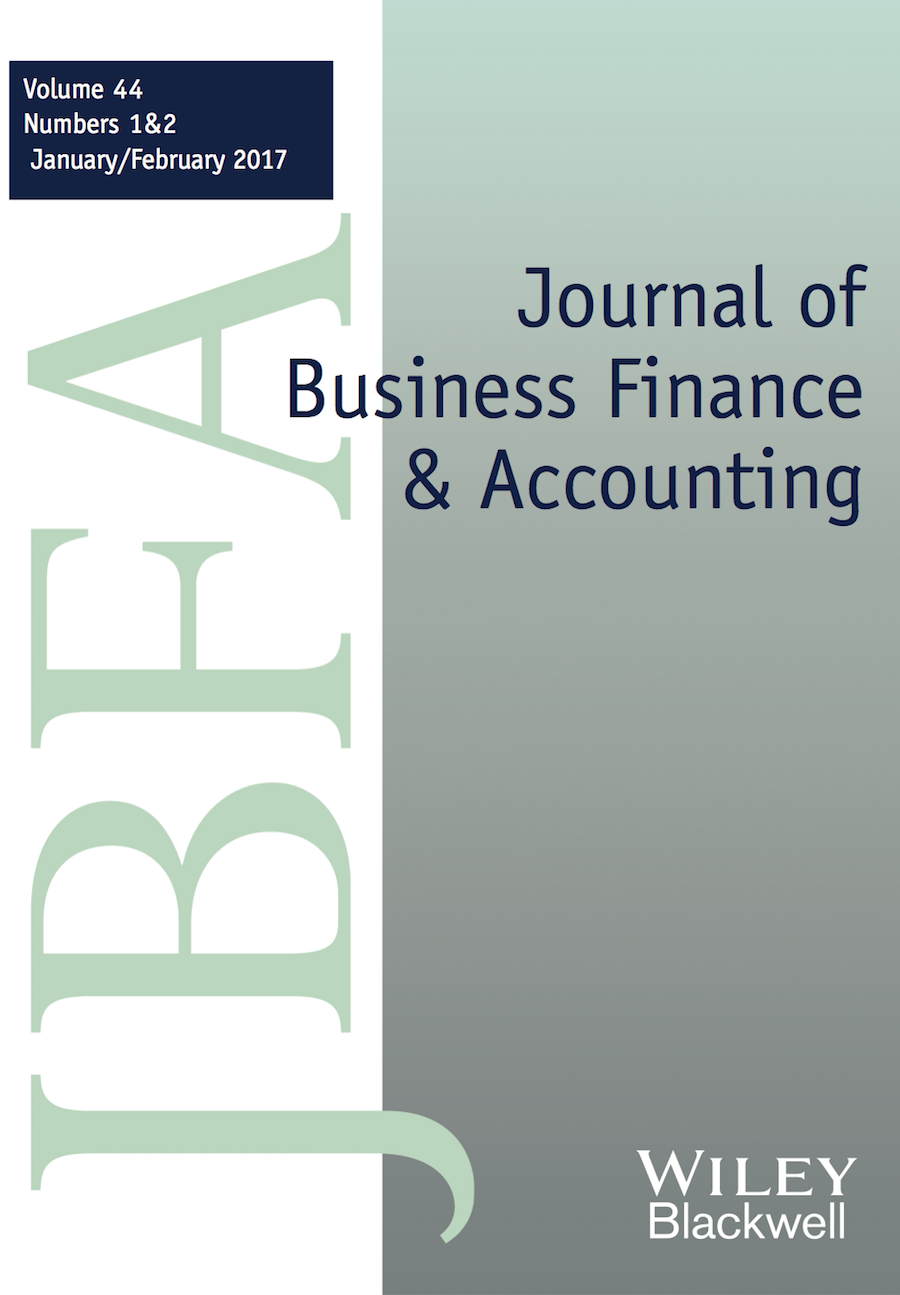
State Ownership and Financial Statement Comparability
in: Journal of Business Finance and Accounting, Nr. 7, 2024
Abstract
<p>This paper investigates how state ownership affects financial reporting practices in China. Using several measures of state (government) ownership, we show that a one-standard-deviation increase in state ownership decreases financial statement comparability by 36.61%, and the impact is more pronounced when the central authority has majority control of the company. Moreover, lower earnings quality and lower levels of accounting conservatism among state-owned enterprises (SOEs) may explain the lower accounting comparability between SOEs and non-SOEs (NSOEs). Additionally, similar (different) managerial objectives converge (diverge) financial statement comparability between SOEs and NSOEs. Last, the geographical locations of firms also contribute to financial statement comparability. We employ a difference-in-differences design, changes regression and entropy balancing to mitigate potential endogeneity bias.</p>
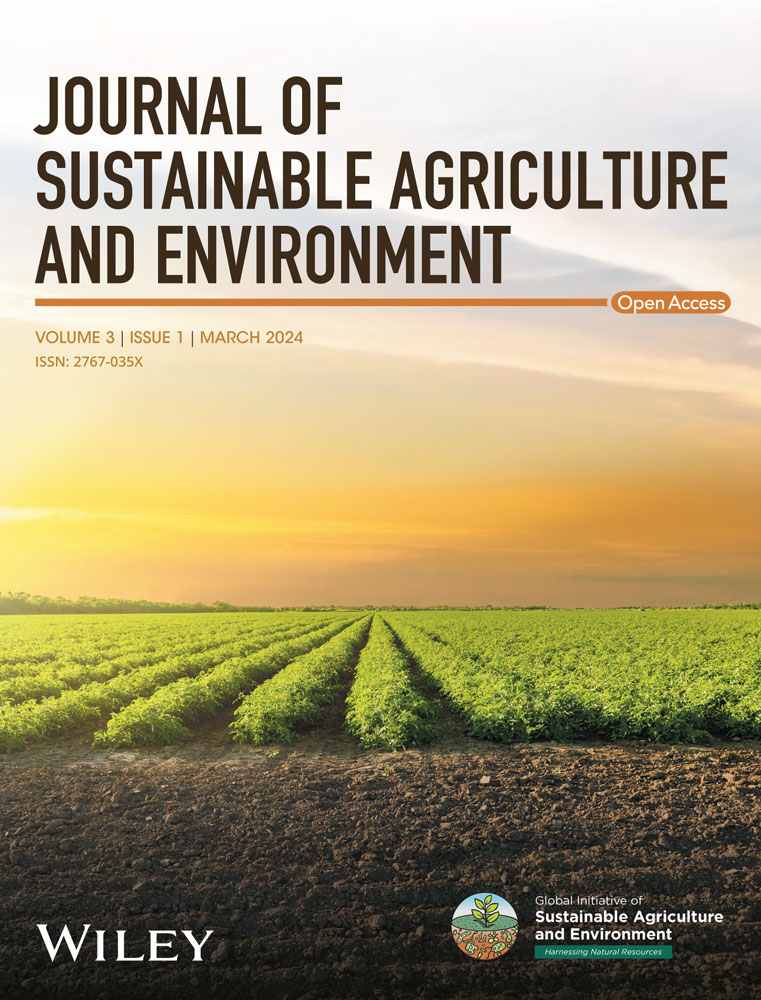
A Belowground Perspective on the Nexus between Biodiversity Change, Climate Change, and Human Well-being
in: Journal of Sustainable Agriculture and Environment, Nr. 2, 2024
Abstract
<p>Soil is central to the complex interplay among biodiversity, climate, and society. This paper examines the interconnectedness of soil biodiversity, climate change, and societal impacts, emphasizing the urgent need for integrated solutions. Human-induced biodiversity loss and climate change intensify environmental degradation, threatening human well-being. Soils, rich in biodiversity and vital for ecosystem function regulation, are highly vulnerable to these pressures, affecting nutrient cycling, soil fertility, and resilience. Soil also crucially regulates climate, influencing energy, water cycles, and carbon storage. Yet, climate change poses significant challenges to soil health and carbon dynamics, amplifying global warming. Integrated approaches are essential, including sustainable land management, policy interventions, technological innovations, and societal engagement. Practices like agroforestry and organic farming improve soil health and mitigate climate impacts. Effective policies and governance are crucial for promoting sustainable practices and soil conservation. Recent technologies aid in monitoring soil biodiversity and implementing sustainable land management. Societal engagement, through education and collective action, is vital for environmental stewardship. By prioritizing interdisciplinary research and addressing key frontiers, scientists can advance understanding of the soil biodiversity–climate change–society nexus, informing strategies for environmental sustainability and social equity.</p>

The Bright Side of Bank Lobbying: Evidence from the Corporate Loan Market
in: Journal of Corporate Finance, June 2024
Abstract
<p>Bank lobbying has a bitter taste in most forums, ringing the bell of preferential treatment of big banks from governments and regulators. Using corporate loan facilities and hand-matched information on bank lobbying from 1999 to 2017, we show that lobbying banks increase their borrowers' overall performance. This positive effect is stronger for opaque and credit-constrained borrowers, when the lobbying lender possesses valuable information on the borrower, and for borrowers with strong corporate governance. Our findings are consistent with the theory positing that lobbying can provide access to valuable lender-borrower information, resulting in improved efficiency in large firms' corporate financing.</p>

Supranational Rules, National Discretion: Increasing versus Inflating Regulatory Bank Capital?
in: Journal of Financial and Quantitative Analysis, Nr. 2, 2024
Abstract
<p>We study how banks use “regulatory adjustments” to inflate their regulatory capital ratios and whether this depends on forbearance on the part of national authorities. Using the 2011 EBA capital exercise as a quasi-natural experiment, we find that banks substantially inflated their levels of regulatory capital via a reduction in regulatory adjustments — without a commensurate increase in book equity and without a reduction in bank risk. We document substantial heterogeneity in regulatory capital inflation across countries, suggesting that national authorities forbear their domestic banks to meet supranational requirements, with a focus on short-term economic considerations.</p>

Does IFRS Information on Tax Loss Carryforwards and Negative Performance Improve Predictions of Earnings and Cash Flows?
in: Journal of Business Economics, January 2024
Abstract
We analyze the usefulness of accounting information on tax loss carryforwards and negative performance to predict earnings and cash flows. We use hand-collected information on tax loss carryforwards and corresponding deferred taxes from the International Financial Reporting Standards tax footnotes for listed firms from Germany. Our out-of-sample tests show that considering accounting information on tax loss carryforwards does not enhance performance forecasts and typically even worsens predictions. The most likely explanation is model overfitting. Besides, common forecasting approaches that deal with negative performance are prone to prediction errors. We provide a simple empirical specification to account for that problem.
Arbeitspapiere

Capital Requirements, Market Structure, and Heterogeneous Banks
in: IWH Discussion Papers, Nr. 15, 2022
Abstract
Bank regulators interfere with the efficient allocation of resources for the sake of financial stability. Based on this trade-off, I compare how different capital requirements affect default probabilities and the allocation of market shares across heterogeneous banks. In the model, banks‘ productivity determines their optimal strategy in oligopolistic markets. Higher productivity gives banks higher profit margins that lower their default risk. Hence, capital requirements indirectly aiming at high-productivity banks are less effective. They also bear a distortionary cost: Because incumbents increase interest rates, new entrants with low productivity are attracted and thus average productivity in the banking market decreases.
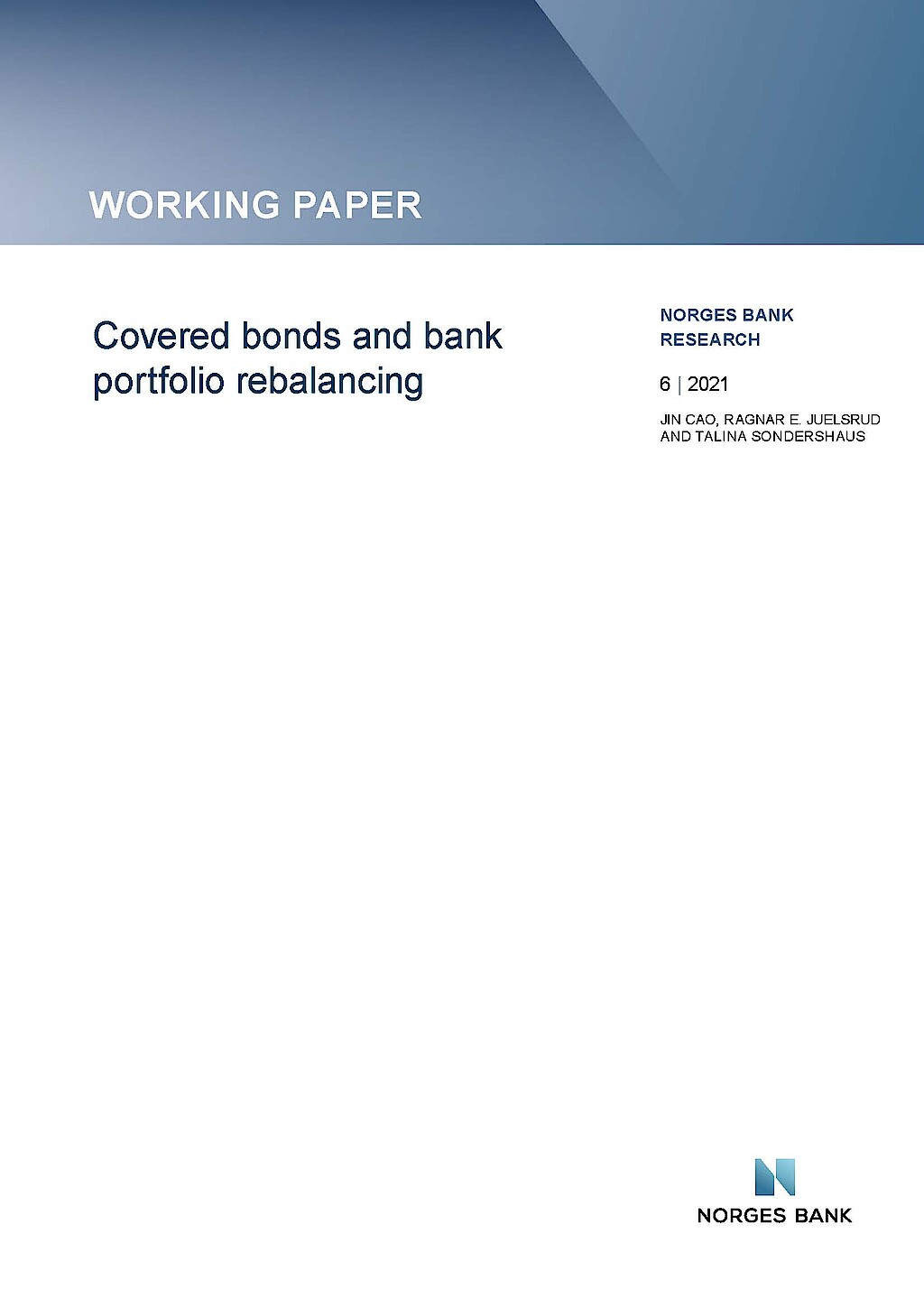
Covered Bonds and Bank Portfolio Rebalancing
in: Norges Bank Working Papers, Nr. 6, 2021
Abstract
We use administrative and supervisory data at the bank and loan level to investigate the impact of the introduction of covered bonds on the composition of bank balance sheets and bank risk. Covered bonds, despite being collateralized by mortgages, lead to a shift in bank lending from mortgages to corporate loans. Young and low-rated firms in particular receive more credit, suggesting that overall credit risk increases. At the same time, we find that total balance sheet liquidity increases. We identify the channel in a theoretical model and provide empirical evidence: Banks with low initial liquidity and banks with sufficiently high risk-adjusted return on firm lending drive the results.
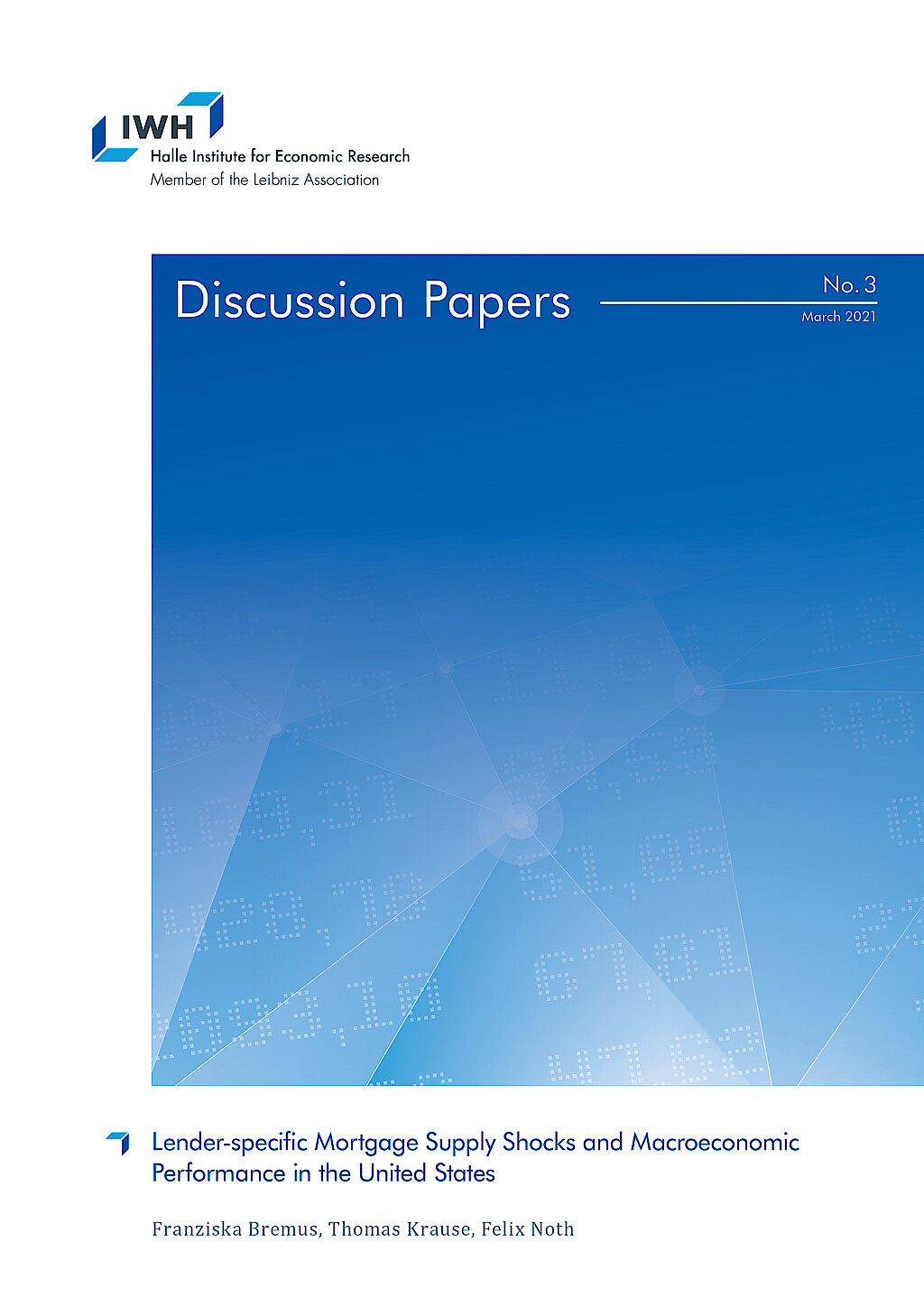
Lender-specific Mortgage Supply Shocks and Macroeconomic Performance in the United States
in: IWH Discussion Papers, Nr. 3, 2021
Abstract
This paper provides evidence for the propagation of idiosyncratic mortgage supply shocks to the macroeconomy. Based on micro-level data from the Home Mortgage Disclosure Act for the 1990-2016 period, our results suggest that lender-specific mortgage supply shocks affect aggregate mortgage, house price, and employment dynamics at the regional level. The larger the idiosyncratic shocks to newly issued mortgages, the stronger are mortgage, house price, and employment growth. While shocks at the level of shadow banks significantly affect mortgage and house price dynamics, too, they do not matter much for employment.
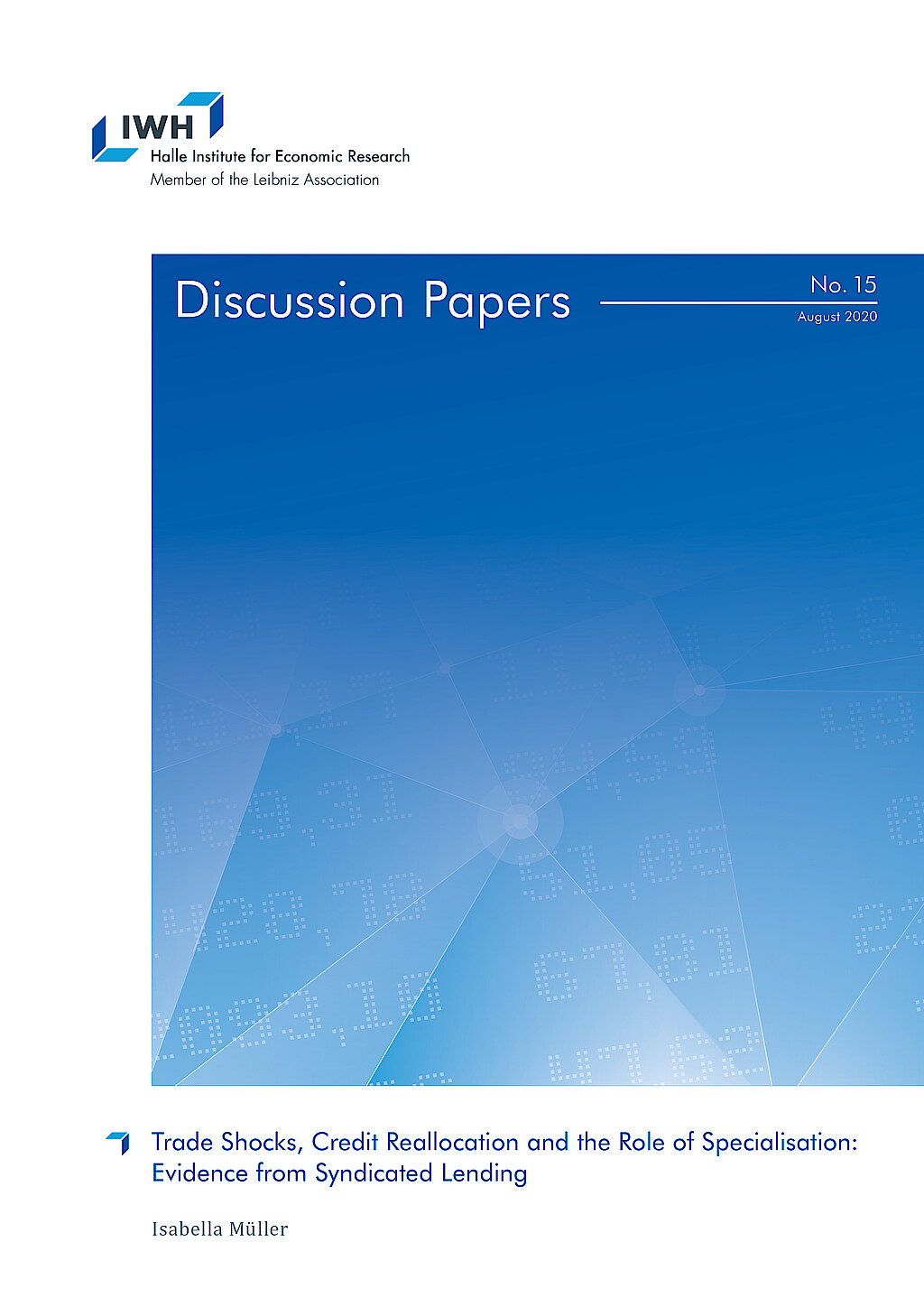
Trade Shocks, Credit Reallocation and the Role of Specialisation: Evidence from Syndicated Lending
in: IWH Discussion Papers, Nr. 15, 2020
Abstract
This paper provides evidence that banks cut lending to US borrowers as a consequence of a trade shock. This adverse reaction is stronger for banks with higher ex-ante lending to US industries hit by the trade shock. Importantly, I document large heterogeneity in banks‘ reaction depending on their sectoral specialisation. Banks shield industries in which they are specialised in and at the same time reduce the availability of credit to industries they are not specialised in. The latter is driven by low-capital banks and lending to firms that are themselves hit by the trade shock. Banks‘ adjustments have adverse real effects.
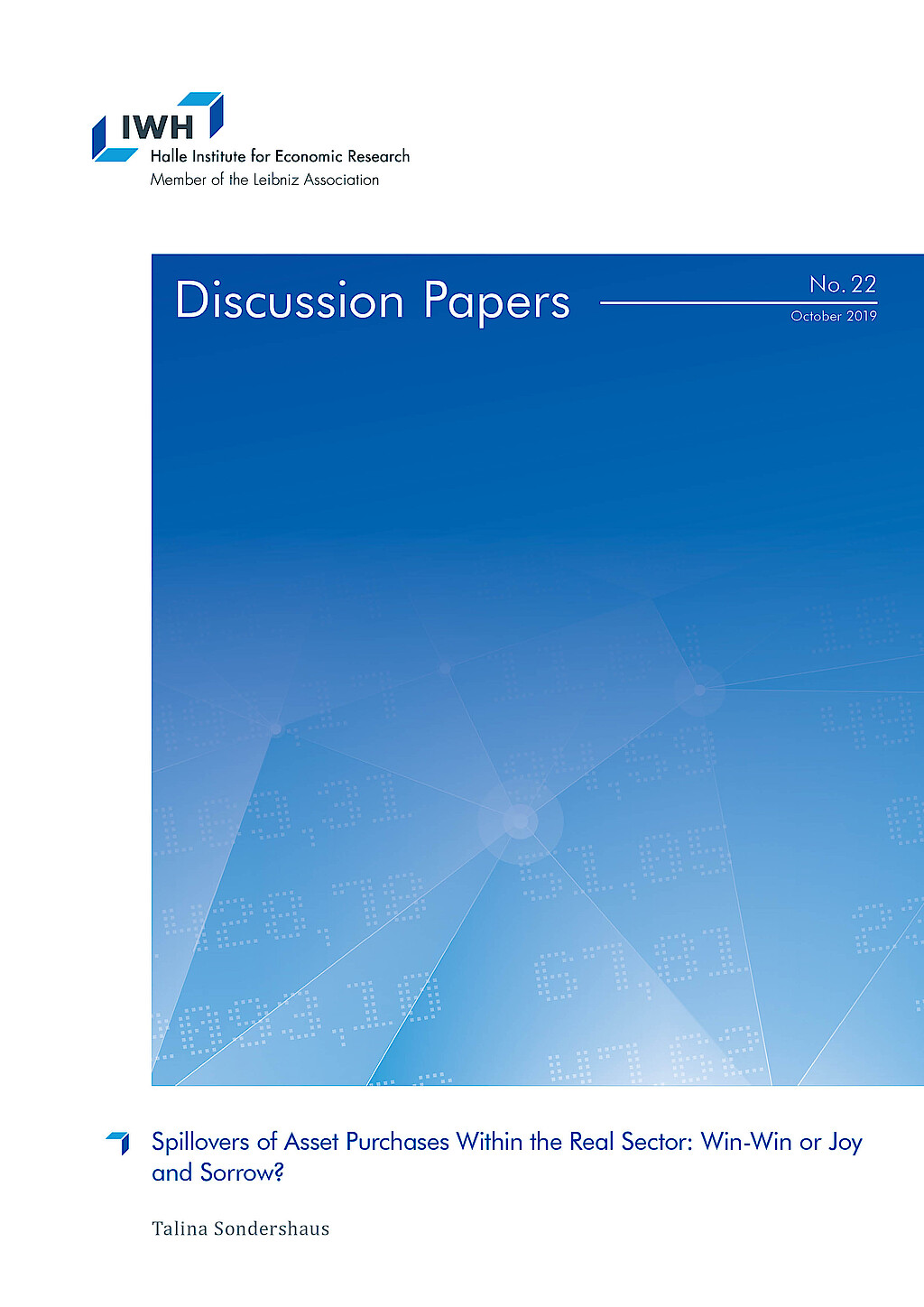
Spillovers of Asset Purchases Within the Real Sector: Win-Win or Joy and Sorrow?
in: IWH Discussion Papers, Nr. 22, 2019
Abstract
Events which have an adverse or positive effect on some firms can disseminate through the economy to firms which are not directly affected. By exploiting the first large sovereign bond purchase programme of the ECB, this paper investigates whether more lending to some firms spill over to firms in the surroundings of direct beneficiaries. Firms operating in the same industry and region invest less and reduce employment. The paper shows the importance to consider spillover effects when assessing unconventional monetary policies: Differences between treatment and control groups can be entirely attributed to negative effects on the control group.



















